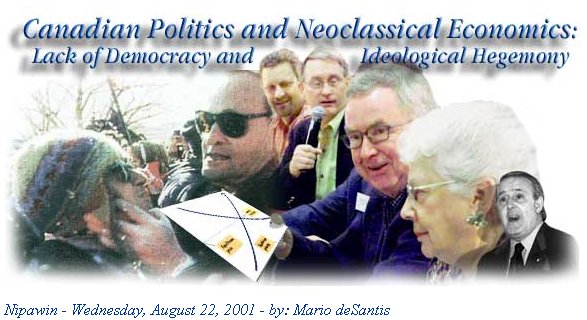Learning Stories
by
Mario deSantis
mariodesantis@hotmail.com
“I am a Canadian, free to speak without fear, free to worship in my own way, free to stand for what I think right, free to oppose what I believe wrong, and free to choose those who shall govern my country.” - -The Rt. Hon. John Diefenbaker, Canadian Bill of Rights, 1960
“The whole judicial system is at issue, it's worth more than one person.”--Serge Kujawa, Saskatchewan Crown Prosecutor, 1991
“The system is not more worth than one person's rights.”--Mario deSantis, 2002
Ensign Stories © Mario deSantis and Ensign
|
|
It was yesterday that I became perplexed on how the Alliance rebels and the conservatives formed a coalition to work together in Parliament. And I became more perplexed on how this coalition was made possible by a phone call former Prime Minister Brian Mulroney made to conservative Elsie Wayne. It was evident last Friday, August 17, that Ms. Wayne had no intention to dilute her involvement in Parliament by a possible agreement with the Alliance rebels. So as the Alliance is undergoing a crisis of leadership and of membership support, we have the Alliance rebels led by Chuck Strahl making a working coalition with Joe Clarke's conservatives. Again, this coalition reminded me of the private contractual deal which occurred in Saskatchewan between the NDP's leader Roy Romanow and the renegade Liberal leader Jim Melenchuck. The will of the electorate doesn't count anymore, our governments have no more obligation for the social contract with their electorate, and as a consequence our politics has become an extension of the private contract. The coalition between the Alliance rebels and the conservatives has been formed to provide an alternative to the corrupted Jean Chretien's government, and the alternative reads like this 'you, Liberals, got three governmental mandates and now we want our mandate.' This is our democracy, not for the benefit of the people but for the benefit of the politicians to take turns in directing private contractual deals affecting all of us people. Brian Mulroney brought us the GST tax along with some new 10,000 public employees to alleviate the governmental debt, and now mainstream politicians of any colour are on board to implement the neoclassical economic dogmas such as governmental deregulations, less taxes, more productivity, ever increasing GDP, less government for the people, more government for business, more free trade, longer protection of trade secrets, no welfare for people, and more welfare for business. How is it possible that our political and economic direction is as usual while people are being divided between the few and privileged and the rest of us? And how come people are accepting this state of affairs? I found the answer yesterday as I was reading some material on the debunking of neoclassical economics. The answer is found in understanding the social significance of the concept of ideological hegemony, a concept first elaborated by Antonio Gramsci. Gramsci writes that hegemony is realized in "the 'spontaneous' consent given by the great masses of the population to the general direction imposed on social life by the dominant fundamental group; this consent is 'historically' caused by the prestige which the dominant group enjoys because of its position and function in the world of production." And in one way, we may say that the problem of our decadent democracy lies in the general direction imposed by the dominant fundamental group. And as neoclassical economics is concerned, the problem lies in our conventional economists who by demagogically preaching the trading of capital for people are facilitating economic policies emphasizing ever greater productivity at the expense of people at large. Some references Related social and economic articles published by Ensign Call from Mulroney saves deal. Former PM gets Elsie Wayne to 'look at the big picture.' Jane Taber, National Post and Peter Battistoni, The Vancouver Sun, August 20, 2001 http://www.nationalpost.com/search/story.html?f=/stories/20010820/656440.html Governmental coalition in Saskatchewan: a private contractual deal at the expense of the electorate? by Mario deSantis, October 4, 1999 http://www.ftlcomm.com/ensign/desantisArticles/desantis71/GovContract-Oct04-99.html Carl Cuneo's Notes on the Concept of Hegemony in Gramsci. Sociology 2R3: Theories of Social Inequality http://www.socsci.mcmaster.ca/soc/courses/soc2r3/gramsci/gramheg.htm Note: The absurdity of the dogma of pursuing an ever increasing productivity can be understood by the fact that by firing employees a business increases its productivity (production per employee). Timothy Shire, publisher of Ensign, has been saying for a long time that our Business Schools have become more of a training business programs rather than learning centres. |
